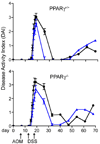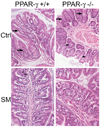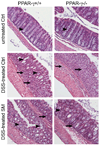Suppression of intestinal inflammation and inflammation-driven colon cancer in mice by dietary sphingomyelin: importance of peroxisome proliferator-activated receptor γ expression
- PMID: 21295961
- PMCID: PMC3135670
- DOI: 10.1016/j.jnutbio.2010.09.017
Suppression of intestinal inflammation and inflammation-driven colon cancer in mice by dietary sphingomyelin: importance of peroxisome proliferator-activated receptor γ expression
Abstract
Inflammation of the gastrointestinal tract increases the risk of developing colon cancer especially in younger adults. Dietary compounds are not only associated with the etiology of inflammation and colon cancer but also in their prevention. Sphingolipid metabolites have been shown to play a role in the initiation and perpetuation of inflammatory responses. In the present study, we investigated the suppression of dextran sodium sulfate-induced colitis and azoxymethane-induced colon cancer by dietary sphingomyelin (SM) in mice that lack functional peroxisome proliferator-activated receptor γ (PPAR-γ) in intestinal epithelial and immune cells. Dietary SM decreased disease activity and colonic inflammatory lesions in mice of both genotypes but more efficiently in mice expressing PPAR-γ. The increased survival and suppression of tumor formation in the SM-fed mice appeared to be independent of PPAR-γ expression in immune and epithelial cells. Using a real-time polymerase chain reaction array, we detected an up-regulation in genes involved in Th1 (interferon γ) and Th17 (interleukin [IL]-17 and IL-23) responses despite the reduced inflammation scores. However, the genes involved in Th2 (IL-4, IL-13 and IL-13ra2) and Treg (IL-10rb) anti-inflammatory responses were up-regulated in a PPAR-γ-dependent manner. In line with the PPAR-γ dependency of our in vivo findings, treatment of RAW macrophages with sphingosine increased the PPAR-γ reporter activity. In conclusion, dietary SM modulated inflammatory responses at the early stages of the disease by activating PPAR-γ, but its anticarcinogenic effects followed a PPAR-γ-independent pattern.
Copyright © 2011 Elsevier Inc. All rights reserved.
Figures










References
-
- Horner MJRL, Krapcho M, Neyman N, Aminou R, Howlader N, Altekruse SF, Feuer EJ, Huang L, Mariotto A, Miller BA, Lewis DR, Eisner MP, Stinchcomb DG, Edwards BK, editors. Seer cancer statistics review, 1975–2006, national cancer institute. Bethesda, md: 2009. http://seer.Cancer.Gov/csr/1975_2006/, based on november 2008 seer data submission, posted to the seer web site.
-
- Bleyer AOLM, Barr R, Ries LAG, editors. Cancer epidemiology in older adolescents and young adults 15 to 29 years of age, including seer incidence and survival: 1975–2000. Bethesda, MD: National Cancer Institute; 2006. NIH Pub. No. 06-5767.
-
- WCRF/AICR. Nutrition, physical activity and the prevention of cancer: A global perspective. Washington, DC: AICR; 2007.
-
- Schmelz EM, Bushnev AS, Dillehay DL, Liotta DC, Merrill AH., Jr Suppression of aberrant colonic crypt foci by synthetic sphingomyelins with saturated or unsaturated sphingoid base backbones. Nutr Cancer. 1997;28:81–85. - PubMed
Publication types
MeSH terms
Substances
Grants and funding
LinkOut - more resources
Full Text Sources

